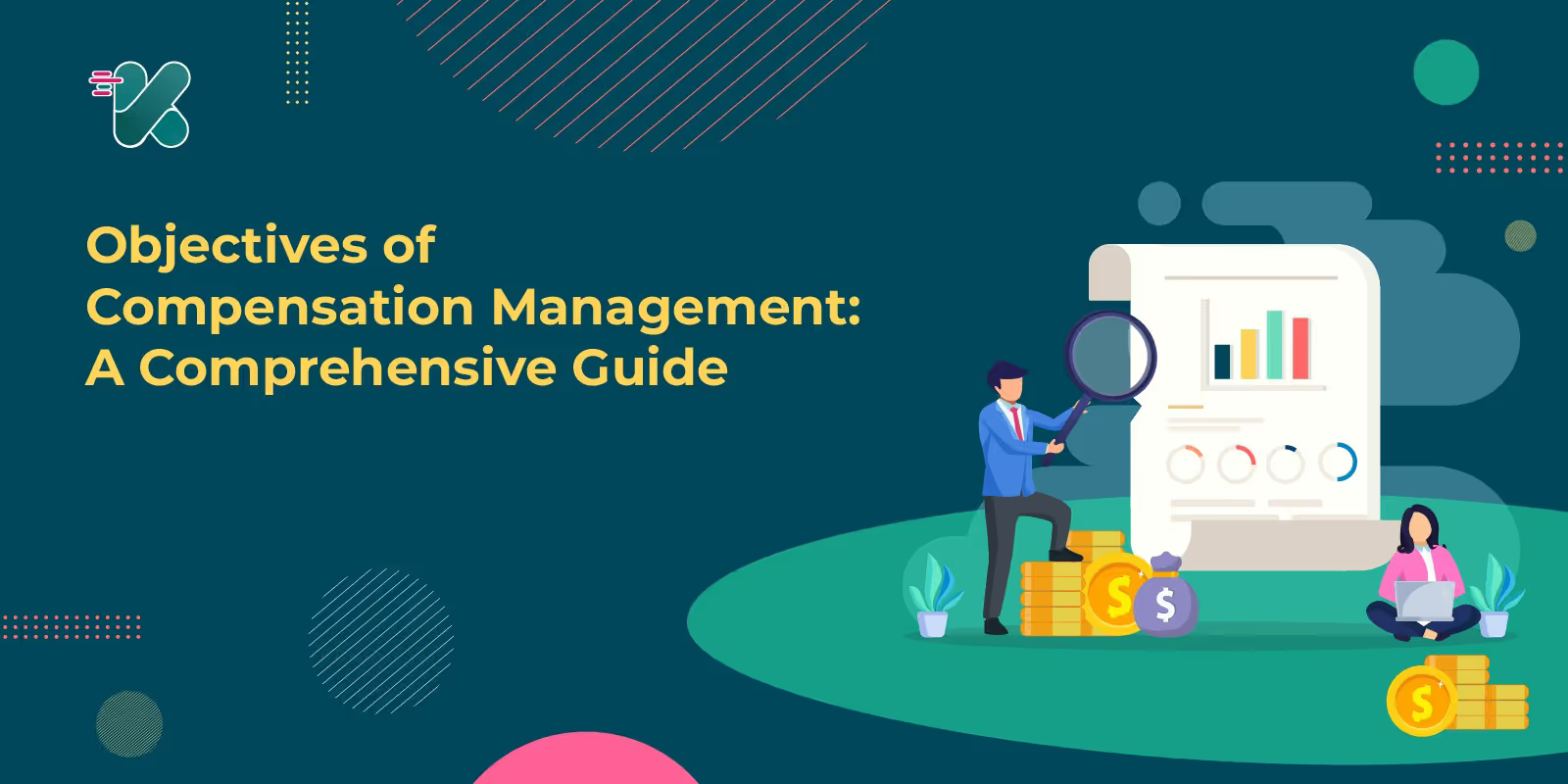
Blog
Objectives of Compensation Management: Attract, Retain & more
October 18, 2024


Key Insights
Objectives of Compensation Management: A Comprehensive Guide
BambooHR’s 2024 compensation trends say that: despite 58% of employees feeling good about their current compensation, nearly one in four are still dissatisfied with their latest salary increase. In fact, 30% of employees have negative feelings about their pay: 21% felt frustrated, and 14% were flat-out unhappy.
Employee happiness is deeply tied to compensation, and that happiness directly affects performance. It’s like a domino effect. If you get compensation wrong, your employees won’t be motivated, and when motivation tanks, productivity takes a hit. It's simple math: employees + unfair pay = lower performance.
Managing compensation is no walk in the park. It's one of the trickiest puzzles that HR teams and employers face, yet it’s one of the most important.
So, how do you make sure everyone feels valued without sending your payroll costs through the roof? That’s where the magic of compensation management comes in!
Let’s dive right into it!
What is Compensation Management?
Compensation management is literally a delicate art of making your employees feel valued while keeping your business’s financial health in check at the same time. It involves designing and implementing policies and strategies to ensure that employees are fairly compensated for their efforts, skills, and performance.
The Key Objectives of Compensation Management
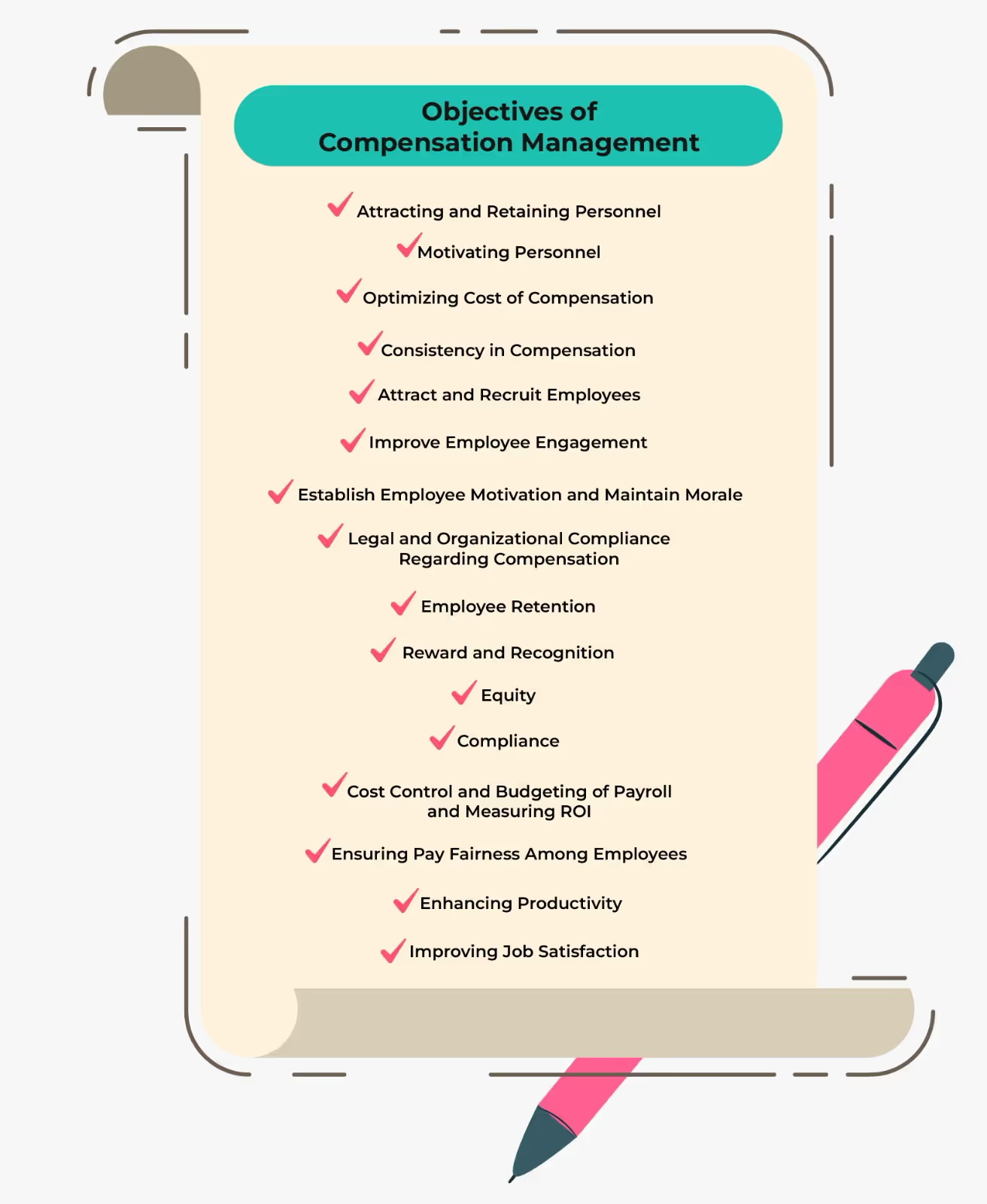
- Attract and Recruit Employees:
Offering competitive salaries and perks can make your company irresistible to job seekers. According to a Glassdoor survey, 67% of job hunters said salary is a key factor when looking for a new role.
- Improve Employee Engagement:
A well-thought-out compensation plan can keep employees engaged. People want to feel rewarded for their hard work, and money is a big part of that.
- Establish Employee Motivation and Maintain Morale
When employees know they’ll be fairly compensated for extra effort, they’re more likely to stay motivated and keep morale high.
- Legal and Organizational Compliance
Compensation management also ensures you’re following labor laws and industry standards. This reduces the risk of lawsuits or other compliance issues.
- Employee Retention
Nothing drives people away faster than feeling underpaid. Compensation management helps you keep your best talent by making sure they feel valued.
- Reward and Recognition
Beyond just salary, a good compensation plan recognizes achievements and hard work, keeping employees happy and boosting their loyalty.
- Equity
Fair pay for all. Compensation management strives to make sure there’s no pay disparity across gender, ethnicity, or other lines. In fact, organizations with strong pay equity are 19% more likely to retain talent.

- Compliance
Staying compliant with legal regulations, such as minimum wage laws, helps protect the company from potential legal troubles.
- Cost Control and Budgeting
Payroll is typically one of the biggest expenses for companies. Effective compensation management ensures you’re getting the most value from that spend and can measure the return on investment (ROI) of your compensation programs.
- Ensuring Pay Fairness
Fair compensation across the board creates a healthy work environment. No one wants to feel short-changed!
- Enhancing Productivity:
Happy employees are productive employees. When your team feels fairly compensated, they’re more motivated to give their best effort.
- Improving Job Satisfaction:
A well-compensated employee is a satisfied employee. Satisfied employees tend to stick around longer, reducing turnover.
💡To know more about compensation management, read our previous blogs:
Building the new era of Incentive Compensation Management
What Is Compensation Consulting? A Simple Guide
Types of Compensation Management
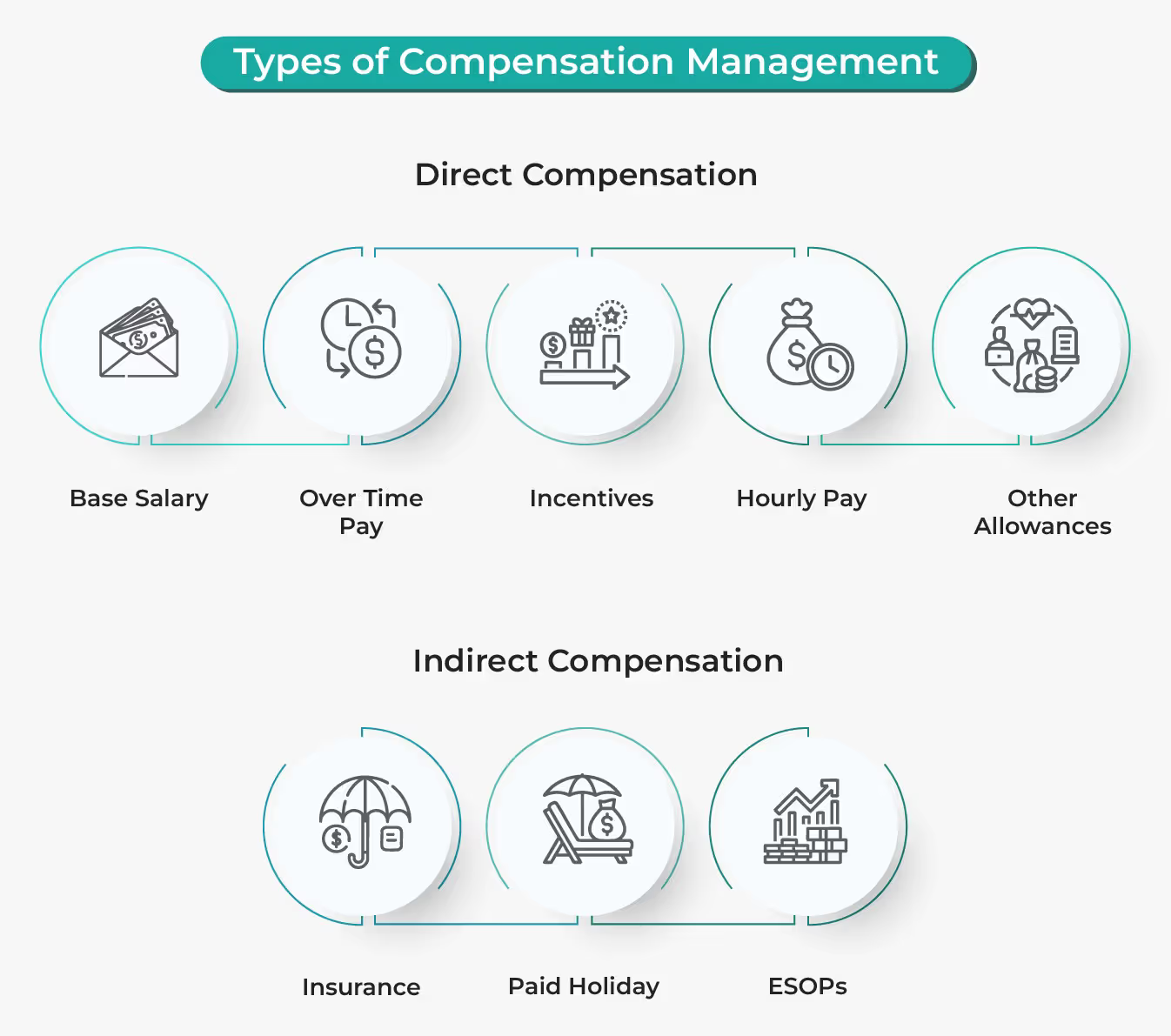
Compensation comes in many forms, typically two of them.
Let’s break it down:
Direct Compensation
- Base Salary
This is the fixed amount employees earn before bonuses, overtime, or benefits. It’s the core of what you’re paying them.
- Overtime Pay
Compensation for those extra hours when employees go above and beyond.
- Incentives
Bonuses, commissions, and other incentives are great ways to reward performance. They’re also fantastic motivators, if employees know they can earn more by achieving goals, they’re more likely to push themselves.
- Hourly Pay
The classic “you work, you get paid” model. Many part-time or hourly workers fall under this category.
- Other Allowances
These could be things like transportation allowances, meal allowances, or even housing stipends. It’s all about giving employees extra perks to make their lives easier.
Indirect Compensation
- Insurance
Health, dental, and vision, benefits are often as important as salary for employees. According to a survey by Glassdoor, 80% of employees would prefer additional benefits to a pay raise.
- Paid Holiday
Vacation time is key. Employees need time to recharge, and paid holidays help them do that without worrying about lost wages.
- ESOPs (Employee Stock Ownership Plans)
Offering employees stock options can make them feel more invested (literally) in the company’s success.
What Are Some Challenges to Meeting Compensation Management Objectives
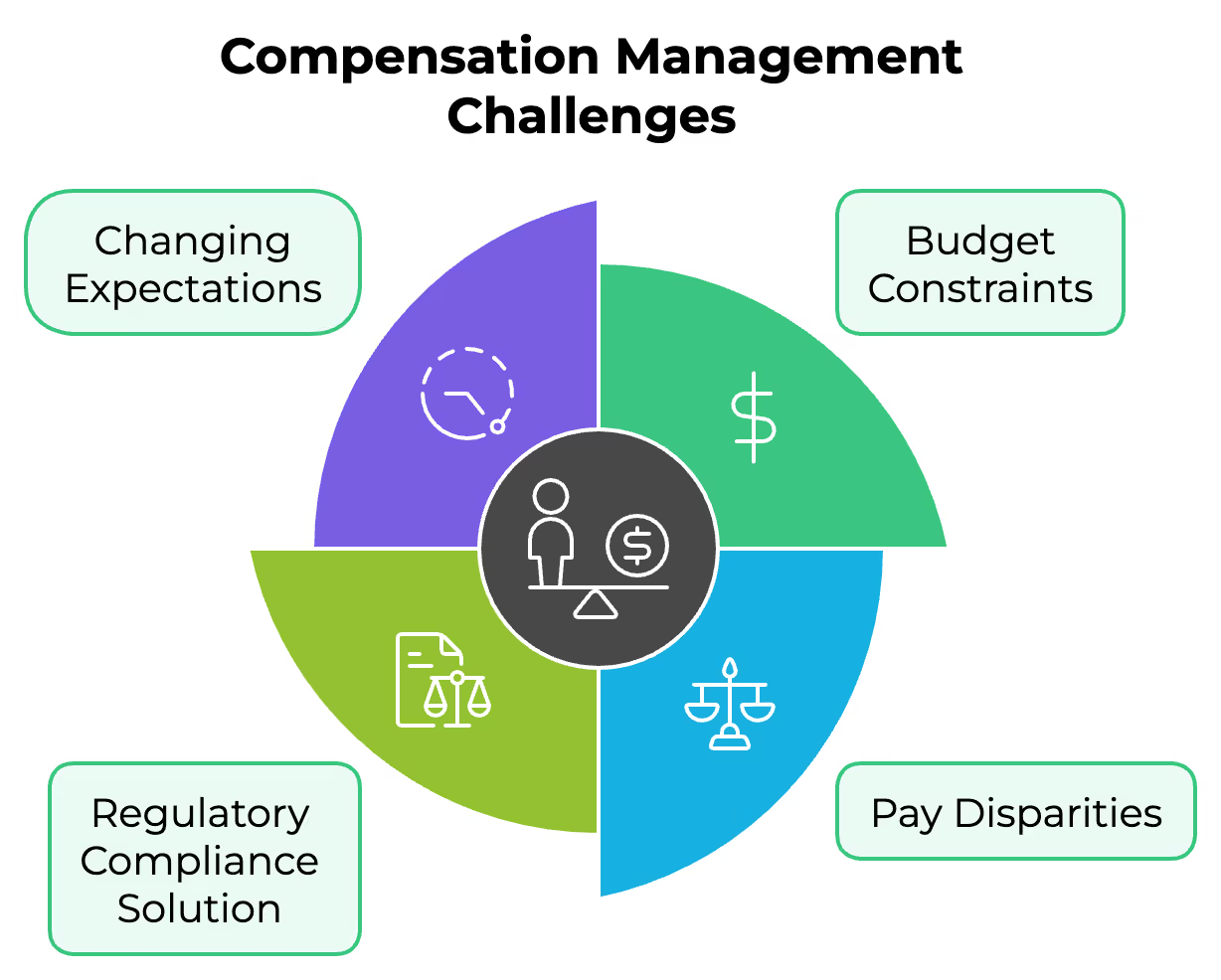
- Budget Constraints
Companies often need more financial resources, making it difficult to pay top dollar for every role while staying within budget.
- Pay Disparities
Even unintentional differences in pay can lead to dissatisfaction and feelings of unfairness among employees.
- Regulatory Compliance Solution
Invest in compensation management software that tracks changing regulations and automates compliance processes to avoid errors and penalties.
- Changing Expectations
Employees today are looking for more than just a paycheck, they want flexibility, meaningful benefits, and career development opportunities.
Best Practices for Managing Employee Compensation Effectively
Now that we’ve gone over the nitty-gritty, here are some tried-and-true best practices to help you manage compensation like a pro:
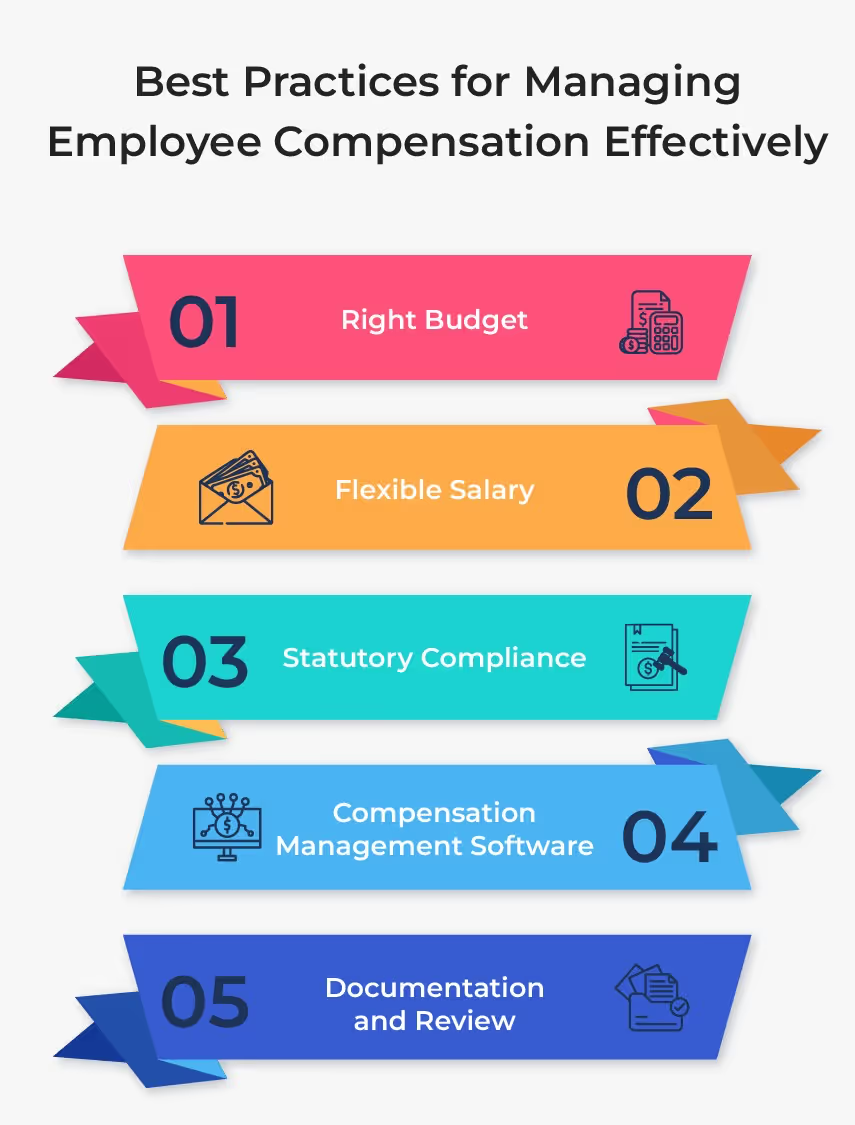
✅Right Budget
Always work within your budget, but be strategic. Allocate funds for competitive salaries while still maintaining the company’s bottom line.
✅Flexible Salary Structures
Different employees have different needs. Some might prefer higher base pay, while others might be more motivated by bonuses or stock options. Flexibility allows you to offer tailored compensation packages.
✅Statutory Compliance
Stay up-to-date on labor laws and regulations to avoid penalties and ensure you’re treating employees fairly.
✅Compensation Management Software
There’s plenty of software out there that can make managing payroll, bonuses, and benefits a breeze. This can help you stay organized and ensure everyone’s getting paid correctly.
For a top-tier, all-in-one solution to compensation management- Kennect can be a smart choice. It’s designed to handle everything from start to finish, streamlining the entire process. You can book a free demo with experts to see the tool in action.
✅Documentation and Review
Regularly review your compensation structure to ensure it’s still competitive and aligned with your goals. Document everything, transparency is key!
Conclusion
So, before you close this tab, take a moment to ask yourself: is your compensation strategy really working for your people, or just working on paper? The good news is that it’s never too late to make tweaks that could have lasting impacts on your team’s morale, and your bottom line. After all, when compensation is done right, everybody wins!
ReKennect : Stay ahead of the curve!
Subscribe to our bi-weekly newsletter packed with latest trends and insights on incentives.
Thank you! Your submission has been received!
Oops! Something went wrong while submitting the form.
Your data is in safe hands. Check out our Privacy policy for more info











